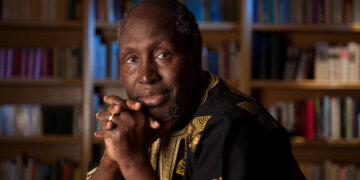I hold the opinion that theatre is the highest form of art, delivered in the humblest of ways. Unlike other forms of art, theatre doesn’t ask us to suspend disbelief. It doesn’t try to present fiction as reality. When Juliet cries, “O happy dagger! This is thy sheath; there rust, and let me die,” and drives a dagger through her heart, we don’t actually believe she’s dead. And yet, theatre, like a charming seductress, lures us into a willing belief of disbelief. Only the highest form of art can wield such power.
As renowned playwright Arthur Miller once said: “The mission of the theater, after all, is to change, to raise the consciousness of people to their human possibilities.”
As in other places in the world, the first theatrical performance in Kenya grew out of ritualistic, spiritual or cultural music, dance and narrative. It would have sprouted from gueyo or sigueya — a type of mourning elegy the Luo people of Kenya use to extol the virtues of the deceased while perpetuating the continuity of life beyond the mere flesh. Or the war dances of the Gikuyu such as the kibata dance. Or the Adumu dance of the Maasai and Luhya’s vigorous shaking of their backs.
In his essay Enactments of Power: The Politics of Performance Space, author Ngũgĩ wa Thiong’o writes about the role of theatre in pre-colonial Kenya: “If before the emergence of the state, the domain of culture embodied the desirable and the undesirable in the realm of values, this was expressed through performance.”
Theatre as we know it today, was introduced during the colonial era as an import from Europe, accompanying Christianity and colonialism. This modern theatre is considered to have originated in France, flourishing a thousand years ago with performances in churches, graveyards, town squares and taverns. The 17th-century French playwright and actor Molière, one of the world’s most produced dramatists, is said to be single-handedly responsible for launching European-style playwriting in North Africa, where he was known as ‘Sidi Molière’. His reach also stretched to the Middle East where, there are reports, he featured in the repertoire of Iran’s first national theatre.
Across centuries, theatre has defied several prophecies of doom. First there was the advent of radio which the 19th century humans believed would be the end of theatre. Then came the television with silent film era exploits confining people to their TV screens. Later, people swore the internet was destined to strike theatre with the fatal blow. And yet, here we are. Theatre is more alive than ever before. So vibrant it is today that Denzel Washington, one of the most acclaimed screen actors of our time, recently said: “I’m a stage actor who does film, it’s not the other way around. I did stage first. I learned how to act on stage.”
In Kenya, theatre has grown steadily, becoming a fanged champion of the underdog, a custodian of our pained history, an unflinching critic of our governance, our politics and those who politic.
For every rough patch of our country’s 60 years of existence, someone has picked up a pen and another has stepped onto the stage, to point out our error and laugh at our gaucherie. Ngũgĩ wa Thiong’o published his first play The Black Hermit, the first full length play in English to be written by an East African in the post-colonial era. The play was first staged at the Uganda National Theatre in the late 1962, with the opening performance said to have milked tears from the audience. But its full run was halted after the European community accused the director of attempting to ‘Africanise the theatre’.
Rebecca Njau’s The Scar (1963), staged in Uganda, Kenya, Ghana, Tanzania and USA, tackled themes of gender and patriarchal issues. As scholar Rose Wangui Komu notes, the play “exposed how patriarchy thrives by colonising the minds and perceptions of women who, in most cases, are its worst victims.”
Ngugi’s 1967 play This Time Tomorrow became one of Kenya’s earliest examples of drama for social protest. In the play, he advocates for Marxism over realism, making his characters take more proactive roles in uniting to solve problems that beset them.
The 70s through the 90s saw Kenyan theatre take a harder stance on politics. Ngũgĩ wa Thiong’o and Ngugi wa Mirii’s 1978 play Ngaahika Ndeeda (I Will Marry When I Want) was one such play. Exploring the idea of exploitation of the poor by the rich, the play offered a searing look at the legacies of colonialism and the difficulties Kenyans faced at the time. The play was banned by the government and the playwrights imprisoned. In 2022, 45 years later, I Will Marry When I Want returned to the Kenyan stage under the direction of Stuart Nash of Nairobi Performing Arts Studio.
These decades also gave rise to the works of Francis Imbuga with plays like Betrayal in the City (1976) – an allegory of bad leadership in post-colonial Kenya – credited for introducing satire in Kenyan theatre.
The 90s saw the emergence of comedic theatre, popularised by Redykulass group, founded by John Kiarie, Walter Mong’are and Tony Njuguna, university students at the time. In the process of demystifying ‘the big man syndrome’, the production parodied important political figures including former president Moi.
Wahome Mutahi, the master humorist of the 90s behind the Whispers column in The Nation, wrote political satires in Kikuyu through Igiza a production company he co-founded with Dr. Nyamu.
Through political persecution, censorship and even the COVID-19 pandemic, Kenyan theatre has endured. In the last decade, a new generation has emerged to carry the torch. Groups like Too Early for Birds, Millaz Productions, Nairobi Performing Arts Studio and many more continue Kenya’s long tradition of using the stage to challenge the status quo – to shout under bright lights what most would cower to whisper and to stand with the ordinary mwananchi against the insatiable gluttony of the corrupt political class. In May, Kwa Ndego Production will bring to life the story of Wangũ Wa Makeri – the only female Kikuyu leader during the British colonial period in Kenya – at the Kenya National Theatre.
Today, Kenyan theatre stands tall. It says we are here. We are going nowhere. And we will chart the path to a more progressive society. Happy World Theatre Day!
Enjoyed this article?
To receive the latest updates from Sinema Focus directly to your inbox, subscribe now.











